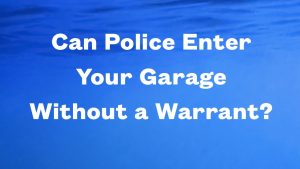Can Police Enter Your Garage Without a Warrant? Not in This Case, Says MN Court of Appeals
On May 19th, the Minnesota Court of Appeals reversed a DWI conviction in State v. Hulne, holding that a police officer’s warrantless entry into the defendant’s attached garage violated the Fourth Amendment. The decision reinforces constitutional protections against unreasonable searches and seizures, clarifying that police may not enter attached garages without a warrant, consent, or a true emergency.
In September 2022, a Moorhead police officer followed a car operating without headlights or taillights. As the driver was pulling into his attached garage, the officer activated his emergency lights and parked behind him. The driver exited his vehicle and stood just inside the garage. The officer, standing outside, repeatedly asked him to step out and talk. The driver refused and eventually said, “I can close my garage door.” At that point, the officer entered the garage, grabbed him by the arm, and pulled him outside to begin a DWI investigation. The officer later arrested him for driving with a blood alcohol content of 0.176.
Under both the U.S. and Minnesota Constitutions, warrantless entries into homes are presumed unconstitutional, and this protection extends to attached garages. There are only two recognized exceptions: consent and exigent circumstances. To justify entry without a warrant, the state must show that the occupant consented, or that the officer had both probable cause and an urgent need to act without delay. Here, neither applied. Instead, the district court denied the driver’s motion to suppress evidence, reasoning that he had committed the offense of fleeing a peace officer by going into his garage and refusing to come out during a traffic stop. However, the officer testified that he was not arresting him when he entered the garage but was merely initiating a DWI investigation.
On appeal, the Minnesota Court of Appeals rejected the district court’s reasoning and reversed conviction. Even assuming probable cause to arrest for fleeing, the court emphasized there were no exigent circumstances justifying warrantless entry. There was no hot pursuit, no threat to public safety, and no imminent destruction of evidence. Furthermore, the officer admitted that the driver had not consented to entry and that there was time to obtain a warrant. Even though the garage door was open and the officer just feet away, the officer’s failure to meet the requirements of warrantless entry justified reversal of conviction by the Court of Appeals.
This ruling confirms that retreating into a garage during a traffic stop does not, on its own, create an emergency or justify a warrantless entry by police. This ruling also reaffirms constitutional protections against unreasonable searches and seizures apply to the garage as it would to a home. For Minnesota defense attorneys, the case strengthens challenges to suppress evidence obtained through warrantless home or garage entries and ensures that officers must meet strict legal standards before invading constitutionally protected spaces.
Robert H. Ambrose is a criminal defense attorney and DWI lawyer in Minnesota and Wisconsin. Super Lawyers named him a Super Lawyer for the past four years and a Rising Star in the preceding six years. He is an adjunct professor at the University of Minnesota Law School. Criminal Defense Lawyer Woodbury, Criminal Defense Attorney Wisconsin, DWI Attorney Minnesota.
